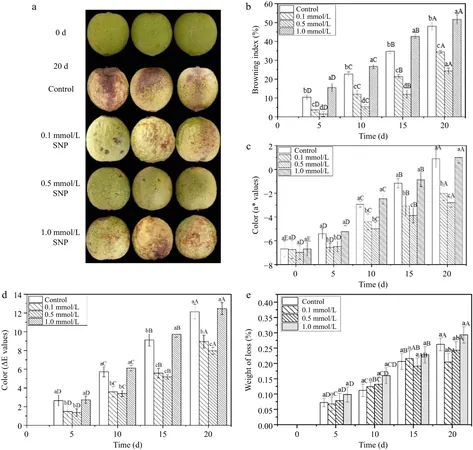
Revolutionary Nitric Oxide Treatment Could Extend Walnut Shelf Life and Quality Like Never Before!
2024-11-04
Author: Noah
Introduction
Recent groundbreaking research has uncovered that sodium nitroprusside (SNP), a form of nitric oxide treatment, significantly enhances the preservation of fresh walnuts. This innovative treatment not only reduces decay but also maintains the visual appeal and high quality of the nuts, making it a potential game-changer for producers looking to increase shelf life and minimize waste.
The Challenge of Walnut Preservation
Walnuts are celebrated for their high nutritional value, delightful crunch, and rich flavor. However, their inherent high water content renders them susceptible to rapid decay and browning during storage. Traditional preservation techniques, such as irradiation and modified atmosphere packaging, while useful, can be overly complicated and costly for large-scale implementation.
Breakthrough Research
Sodium nitroprusside has previously shown promise in boosting stress tolerance across a variety of fruits and vegetables, but this research marks the first exploration of its application specifically for fresh walnuts. Published in the journal Food Innovation and Advances, the findings present a practical solution for walnut growers aiming to reduce spoilage and enhance product qualities.
Experimental Findings
In the experiment, researchers applied various SNP concentrations to walnuts and monitored their characteristics, including appearance, color, and decay rates over a span of 20 days. The findings revealed that walnuts treated with a concentration of 0.5 mmol/L SNP displayed a remarkable 59.7% reduction in decay and a 31.3% improvement in browning. Moreover, these walnuts maintained a fresh green color and smooth skin.
Mechanism of Action
Further analysis showed that the SNP treatment significantly improved the activity of disease-resistant enzymes, such as chitinase (CHI) and β-1,3-glucanase (GLU), crucial for warding off fungal infections. This concentration also curbed ethylene production, which can lead to quicker ripening, resulting in a 14% decline in respiratory rates, effectively delaying spoilage.
Quality Assessment
In addition to improved decay resistance, the treatment enhanced antioxidant enzyme activities, helping regulate reactive oxygen species (ROS) and ensuring walnut quality remained intact. The sensory evaluation revealed that walnuts treated with SNP received high marks from consumers for taste, aroma, crispness, and reduced rancidity.
Expert Opinion
Dr. Liping Qiao, the lead researcher, expressed enthusiasm about the findings, stating, “Our research demonstrates that SNP treatment, particularly at a concentration of 0.5 mmol/L, significantly reduces decay, manages oxidative damage, and boosts walnut quality during storage. This method is not only cost-effective but also environmentally sustainable.”
Future Implications
If embraced widely, this nitric oxide approach could revolutionize how walnuts and other perishable crops are stored. It promises to reduce waste and support sustainable agricultural practices. However, further research is recommended to refine treatment protocols for various walnut varieties and storage conditions, potentially integrating SNP with other preservation methods for enhanced efficacy.
Conclusion
As this innovative technique gains traction, the food industry could stand on the brink of a significant transformation—promising longer-lasting, higher-quality walnuts that contribute to a more sustainable future. Will the adoption of this nitric oxide treatment become the new standard in walnut preservation? Only time will tell!









 Brasil (PT)
Brasil (PT)
 Canada (EN)
Canada (EN)
 Chile (ES)
Chile (ES)
 España (ES)
España (ES)
 France (FR)
France (FR)
 Hong Kong (EN)
Hong Kong (EN)
 Italia (IT)
Italia (IT)
 日本 (JA)
日本 (JA)
 Magyarország (HU)
Magyarország (HU)
 Norge (NO)
Norge (NO)
 Polska (PL)
Polska (PL)
 Schweiz (DE)
Schweiz (DE)
 Singapore (EN)
Singapore (EN)
 Sverige (SV)
Sverige (SV)
 Suomi (FI)
Suomi (FI)
 Türkiye (TR)
Türkiye (TR)